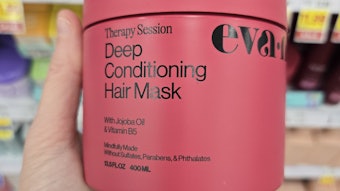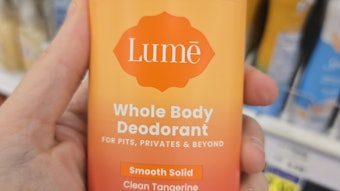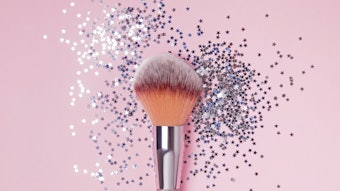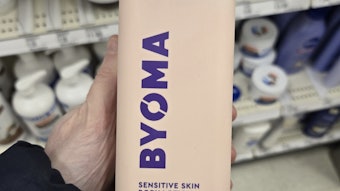
 “Women today suffer from a range of scalp conditions, including itchy scalp (42%), dry scalp (40%), dandruff (26%) and oily scalp (23%),” Denise Herich wrote in the June 2023 edition of Global Cosmetic Industry.
“Women today suffer from a range of scalp conditions, including itchy scalp (42%), dry scalp (40%), dandruff (26%) and oily scalp (23%),” Denise Herich wrote in the June 2023 edition of Global Cosmetic Industry.
This article is only available to registered users.
Log In to View the Full Article
 “Women today suffer from a range of scalp conditions, including itchy scalp (42%), dry scalp (40%), dandruff (26%) and oily scalp (23%),” Denise Herich wrote in the June 2023 edition of Global Cosmetic Industry.
“Women today suffer from a range of scalp conditions, including itchy scalp (42%), dry scalp (40%), dandruff (26%) and oily scalp (23%),” Denise Herich wrote in the June 2023 edition of Global Cosmetic Industry.
The influence of this shift is wide-ranging. For instance, L’Oréal renamed its Active Cosmetics division—which includes SkinCeuticals and Vichy—to L’Oréal Dermatological Beauty in February 2023.
At the time of the announcement, Myriam Cohen-Welgryn, worldwide president of L’Oréal Dermatological Beauty, said, “It helps us stand more clearly for who we are: brands that accompany dermatologists, pediatricians and pharmacists in the daily support to their patients.”
Coty has also highlighted the importance of dermatology recently by making its debut at the 25th World Congress of Dermatology in Singapore. Coty highlighted brands such as Orveda and Lancaster at the event and provided insights on topics such as skin repair solutions, the skin microbiome, oxygen delivery for anti-aging and skin regeneration, molecular biological effects of psychological stress on the skin, and advanced sun protection strategies.
Shimei Fan, Ph.D., chief scientific officer at Coty, explained, “Participating in this event is a significant milestone for the company as we continue to strengthen our commitment to accelerating skin care research, developing more differentiated skin care products and safeguarding the skin health of consumers across the globe, in turn driving the development of the skin care industry.”
Elsewhere, online beauty hub Lookfantastic launched the Dermatological Skincare platform, featuring “expert-approved formulas” and “designed to bring the clinic straight to your door,” per the retailer. Brands featured on the hub include Dermalogica, La Roche-Posay, Perricone MD, Vichy and Dr. Dennis Gross. Key concerns addressed include dark circles, enlarged pores, anti-redness, uneven texture and more.
But this isn’t just a story of prestige brands, specialty niches and premiumization. Earlier this year, Circana’s Larissa Jensen wroteb, “We are observing a democratization of the skin care market, as more consumers decide that they can actually spend less to get the desired results—whether that means purchasing lower price points within the prestige stores or turning to dermatologist-recommended brands in mass outlets.”
The question, then, is: why dermatological skin care and why now? And how can brands across price points harness the movement for marketing and product innovation?
“Two factors are driving increased demand for product efficacy,” says Alex Walther, technical services manager, beauty and personal care, Univar Solutions. “First, the easy access to an unlimited amount of data through the internet on our cell phones. Consumers have more information than ever on the products that they use and how those products can impact their skin health. This leads to the ability to seek out effective skin care solutions that match their skin type, concerns, and goals.”
She adds, “Secondly, the looming threat of an economic downturn leads consumers to look for the most impactful use of their money. This has led to the rise of at-home treatments and devices that enable consumers to achieve professional level results without visiting a clinic, doctor, or dermatologist.”
“Consumers are increasingly intentional about their skin health and understand how their overall health and wellness impacts their outward appearance,” says Michael Nolte, SVP, creative director, BeautyStreams. “They are increasingly pushing demand for evidence-based skin care brands that offer trustworthy, results-driven products backed by skin experts’ credentials, credible pharma-grade ingredients and certified, clinically tested claims.”
Walther notes, “Generating clinical data can be very expensive and the best bet to getting good clinicals on your formula is to use actives and vitamins that already have clinical studies. For example, DSM-Firmenich takes the guesswork out of which vitamins to choose based on application and desired results by thoroughly screening their materials with both in vitro and in vivo studies. This allows brands to be more confident in their clinical results when choosing materials like Stay-C 50, which is a stable analog of ascorbic acid.”
She adds, “DSM-Firmenich has already done the work to prove that Stay-C 50 will bio convert into ascorbic acid to visibly even the skin tone and improve skin firmness. They are also bringing new innovations into personal care with new launches like Quali Vitamin B12 made via fermentation for sensitive and stressed skin. Their studies show that B12 could help relieve fatigued skin, protect the skin barrier and promote a more vibrant looking complexion.”
Regarding the overall trend toward verifiable results, Nolte adds, “There has already been a recent boom in ‘cleanical’ skin care, which has seen brands combining clean and clinical claims to appeal to consumers who are concerned about both efficacy and ingredient safety. Now, we are witnessing a growing focus on evidence-based skin care, with medical-grade brands gaining momentum. Driven by a desire for clear product safety, proven efficacy, ingredient transparency and authoritative guidance, ‘skintellectual’ consumers are showing more preference for science-led skin care brands than ever before, and are searching for brands that boast strong clinical, medical and laboratory backgrounds. With health being top of mind for consumers, skin care products that are backed by dermatologists, doctors, chemists, and skin expert credentials; that are formulated with credible pharma-grade ingredients; and that are certified by clinically tested claims are set to play a crucial role in elevating results-driven skin care innovations.”
Here, we break down some key dynamics within the dermatological skin care movement, including future opportunities.
A Booming Skin Care Market
In the first half of 2023, skin care sales in the prestige market amounted to $4.1 billion, an increase of 14% versus last year, per Circana. For the second quarter, skin care was the fastest-growing category based on sales revenue, up 15%.
Top skin care performers in the first half included prestige face serums, body sprays and facial cleansers. Meanwhile, facial skin care sector sales are flat year-over-year, with usage remaining steady. That said, makeup-skin care hybrid products are ascendant in the category.
Prestige and mass skin care grew at about 14% and 10% in the first half of 2023, respectively, representing a slight gain in pace for prestige and a level growth rate for mass, versus the first quarter.
That said, there are challenges facing prestige brands. Per Circana data, 67% of surveyed consumers say that “skin care brands at drug stores or mass merchandisers are as good as higher priced department store brands.” This represents a rise in such sentiments, year-over-year.
Global Cosmetic Industry previously reportedc on prestige skin care’s premiumization challenge, which is driven by accessibly priced brands that are increasingly delivering effective, clean and even sustainable formulations at easily manageable price points.
Clinical, dermatologist-forward approaches just might offer a pathway forward for prestige brand distinction.
Top Consumer Concerns Driving Clinical Solutions
Sales and search trends point to some of the key concerns that may be driving the clinical skin care sector. For instance, while hand and body lotion sales increased 8.2% in the United Statesd in 2022, eczema and psoriasis treatments jumped 21.6%, per NielsenIQ.
Eczema in particular has driven innovation across categories. For instance, Range Beauty offers inclusive skin-friendly makeup that features soothing ingredients and formulations that comply with guidelines of The National Eczema Association. Key ingredients include calendula, chamomile, green tea and argan oil.
Spatee, meanwhile, has identified a range of concern-oriented searches gaining the most volume. For instance, comedonal acne has experienced a 5.4K increase in average monthly online searches in the United States, while hormonal acne has experienced a 5.0K jump in search volume.
Emerging brands are embracing the acne opportunity while bringing some fun to the category. For instance, Plumpie has launched a range of vegan, cruelty-free hydrocolloid stickers featuring azelaic acid, zinc PCA and salicylic acid.
“Plumpie’s Designer Hydrocolloid Stickers are thicker and larger than traditional pimple patches,” said Ren Carroll-Delapaz, Plumpie brand manager. “They are unique designs made from medical grade hydrocolloid that contain three acne fighting ingredients. We wanted to create a brand centered on people over product. A brand that is innovative, connected and just plain fun. We aren’t reinventing the wheel; we’re adding sequins on it.”
 “We wanted to create a brand centered on people over product,” said Ren Carroll-Delapaz, Plumpie brand manager. “A brand that is innovative, connected and just plain fun. We aren’t reinventing the wheel; we’re adding sequins on it.”
“We wanted to create a brand centered on people over product,” said Ren Carroll-Delapaz, Plumpie brand manager. “A brand that is innovative, connected and just plain fun. We aren’t reinventing the wheel; we’re adding sequins on it.”
The Plumpie stickers are formulated to protect the skin from bacteria, pollution and inflammation while soothing the skin of irritation and redness while they absorb excess oils and pus.
Similarly, Squish Beauty has launched Flower Power Acne Patches, flower-shaped hydrocolloid stickers designed to treat acne.
In July 2023, Spate revealed that #vitamincserum hashtags have experienced 2.6M average weekly views on TikTok. Research has found that hashtags such as #salicylicacid, #retinol and #niacinamide are appearing alongside #vitamincserum, pointing to a rising interest in cocktailing active ingredients, Spate noted.
The firm also tipped skin barrier health as one of the major beauty trends of 2023. Spate noted that skin barrier search activity is often accompanied by format keywords such as cream, oil and serum.
The Estée Lauder Companies has put the skin barrier front-and-center in recent research around its new moisturizing ingredient, Rice Power 11α. By defending the skin barrier, the ingredient reportedly improves skin hydration and imparts anti-aging benefits.
A recent Prime Matter Labs concept formulation also addresses the skin barrier. The Triple Layer Skin Strengthening Moisturizer boosts hydration, collagen production and skin elasticity to strengthen every layer of the skin, per the company. The formulation comprises Chemyunion’s AcquaBio, which comprises plant-based polysaccharides that promote the biological moisturization of the skin, as well as vitamin A alternative Revinage, also from Chemyunion, which enhances cell regeneration for collagen production. It also includes Geltor’s vegan HumaColl 21, which is reportedly a 1-to-1 match to the amino acid sequence of human type 21 collagen.
 Prime Matter Labs’ Triple Layer Skin Strengthening Moisturizer boosts hydration, collagen production and skin elasticity to strengthen every layer of the skin, per the company.
Prime Matter Labs’ Triple Layer Skin Strengthening Moisturizer boosts hydration, collagen production and skin elasticity to strengthen every layer of the skin, per the company.
Dermatologists Front-and-center
According to Mintelf data, 39% of U.S. skin care consumers Gen X or older feel it’s important for skin care products to be recommended by a doctor or dermatologist. In addition, 53% of all U.S. beauty consumers research ingredients as a means of better understanding the efficacy of products. Combined, these data points signal a desire for expert-backed brands and products.
In fact, among its 2023 beauty trends, Mintel highlighted “Beauty Rx,” a concept encompassing the growing “medicalization of beauty” and demand for “efficient and potent products” accompanied by solid claims validation.
“Everyone wants to have better skin (without a filter),” says Walther. “Images from clinical testing can be one of the best tools that brands have to differentiate themselves from the competition. Clinical testing gives brands the opportunity to educate their consumers on a key active that gives real benefits.”
She adds, “Claims made with just words may seem vague or misleading and not convince savvy consumers that the product really does anything. However, an image from clinical testing is easy for everyone to understand and they can build trust and loyalty with their customers.”
These trends, Mintel noted, have led to a “rising influence of professionals,” notably dermatologists, who increasingly play a role not only as brand ambassadors, influencers and R&D leaders, but also as founders.
Dr. Whitney Bowe, a New York-based dermatologist, is emblematic of this confluence of trends. Bowe was responsible for “skin cycling” being one of the most Googled beauty terms in 2022, reflecting the trend’s dominance on TikTok feedsg. The routine consisted of a four-night schedule, with the first two nights dedicated to a particular product step—exfoliation and retinoids, respectively—followed by two “recovery” nights.
Bowe wisely parlayed her social media virality into a trio of products designed for skin cycling routines, consisting of a Retinal Night Advanced 0.1% Retinal Firming Treatment and Exfoliation Night Resurfacing + Brightening Serum, as well as a moisturizing Bowe Glowe Microbiome Nourishing Cream.
Elsewhere, a pair of dermatologists, Laura Scott, MD, and Tia Paul, MD, have collaborated with Lion Pose founders Madhu Punjabi and Nisha Phatak to launch a range of inclusive skin care with clinical leanings. According to the brand, “Lion Pose is dedicated to performing unbiased, third-party clinical testing on diverse skin tones, and selecting skin care ingredients that are safe and effective for all. They strive to provide access to dermatology-grade formulas to all consumers on-the-shelf.”
Lion Pose participated in Sephora Accelerate and Y Combinator and has raised $3 million from investors and celebrities including beauty and wellness fund Ignite XL, Precursor Ventures, Mindy Kaling, Rob Lowe’s LH Capital, Howard Klein, Talia Frenkel (founder of L Brands) and former-CEO of Guthy Renker Ben VandeBunt.
Key SKUs include the Unspotted 4X Acid Jelly Night Serum targeting hyperpigmentation, dark spots, and scarring and featuring a 15% active acid blend including azelaic, glycolic, lactic and tranexamic acids. The Clean at Sephora, U.S.-manufactured serum also includes glutathione to remove dead skin cells for improved skin tone.
Dermatologist Samantha Ellis, MD, has launched a skin care brand, Prequel, in conjunction with brand accelerator The Center. The brand is designed to function in the sweet spot between clinical/medical topicals and over the counter treatments.
 Dermatologist Samantha Ellis, MD (at right), has launched a skin care brand, Prequel, in conjunction with brand accelerator The Center, led by Ben Bennett (at left).
Dermatologist Samantha Ellis, MD (at right), has launched a skin care brand, Prequel, in conjunction with brand accelerator The Center, led by Ben Bennett (at left).
The brand debuted in July 2023 with a trio of SKUs. The Gleanser ($18), formulated for the face and body, features 50% glycerin, inulin and an aquaporin-stimulating active to support skin suppleness. The Skin Utility Ointment ($18) features 45% USP-grade petrolatum to defend the skin from environmental stressors while providing intensive care. Finally, the brand’s Urea Repair 10% Urea Moisturizing Milk for face and body ($22) comprises the namesake 10% pure urea with shea butter, glycerin and niacinamide.
Even dermatology influencers are getting into the act. Inde– Wild recently tapped social media star and dermatologist Muneeb Shah, DO, for a forthcoming product launch scheduled for 2023. On its Instagram feed, the brand’s founder, Diipa Büller-Khosla, noted, “It’s a surreal moment for both of us, celebrating our friendship and individual accomplishments coming together. This is just the beginning, and we cannot wait to take you on the journey of co-creating an innovative product that we know you’ll love!””
Beyond dermatologists, however, there’s another technical expert who’s underleveraged: the cosmetic chemist. Among the few brands launched by chemists is BeautyStat. The brand was founded in 2019 by cosmetic chemist Ron Robinson who tapped his 30-plus years of experience with brands such as Clinique, L’Oréal, Revlon, Le Mer and Rhode by Hailey Bieber. BeautyStat places Robinson’s expertise front-and-center, with the founder often seen on social media dispensing a chemist-eye view of beauty. It’s this mindset that the founder has brought to BeautyStat’s products, which feature technical ingredients and formulations with a focus on results. The brand has continued to grow from its inception and currently boasts 13.5 million TikTok views as of this writing.
Black Consumers: The Missing Piece
Clinical and expert-backed brands have a significant opportunity to tap into widespread dissatisfaction with skin care among Black Americans. Per an Aveeno-OnePoll surveyh of 2,000 consumers in June 2023, 48% of Black Americans believe skin care brands have fallen short of meeting their needs. This is notable considering that 80% of respondents consider their skin sensitive, 64% suffer from rosacea or eczema, and 37% feel insecure every day about their skin issues.
Yet nearly 1/3 have never seen a dermatologist; in fact, 34% have had a hard time finding a doctor that understands their skin health needs. This opens a major opportunity for trusted brands to deliver expert-backed results targeted to underserved consumers.
Those brands need to focus on assisting in product discovery (40% of respondents had trouble finding effective products) and ingredient education (37% have difficulty understanding which ingredients are good or bad for their skin), particularly among Gen Z shoppers.
The Untapped Scalp Opportunity
Scalp care, one of hair care’s hottest innovation opportunities, presents an opportunity for dermatologist and clinical brands to position themselves at the center of the venn diagram between hair and skin wellness.
“Women today suffer from a range of scalp conditions, including itchy scalp (42%), dry scalp (40%), dandruff (26%) and oily scalp (23%),” Denise Herich wrote in the June 2023 edition of Global Cosmetic Industryi. The author was commenting on a survey of more than 3,200 U.S. female-identifying consumers.
Herich noted, “During the past three years, 23% of respondents have begun purchasing (for the first time) products designed especially for her scalp; 24% have bought more scalp-specific products than she did three years prior; and 34% have purposely reduced the number of times per week she washes her hair and scalp.”
She added, “Today’s consumer is more aware of ingredients that may be harsh to her delicate scalp, with 39% noting she reads labels more now to ensure that the product is free of harsh ingredients.”
The Estée Lauder Companies has taken note of consumer interest and has engaged in ongoing research into scalp health. For instance, researchers at Lauder’s Aveda recently found that “a loss of cell signature and identity with age” negatively impacts “the ability of the scalp dermal environment to support and maintain healthy hair follicles.”
Even as emerging research discovers the keys to scalp health over time, dermatologist-created, non-comedogenic hair care brand Seen is tackling day-to-day issues. Iris Rubin, MD, a U.S. dermatologist, focused on removing irritants from hair care products, thereby avoiding pore clogging, eczema and allergic issues.
Given the rising awareness of and interest in scalp health, derm-backed and clinical brands may follow the Seen example to develop skin- and scalp-friendly hair care and treatments.
Future Opportunities
“Consumer priorities, when it comes to their health, are pushing the skin care and wellness industries to leverage medicine and science more than ever before,” says Nolte, “which has led to medically driven consumerism. With consumers now seeking highly personalized, meaningful and preventative forms of health care, solutions that combine skin care, wellness and proactive medicine constitute a fast-growing segment. We are seeing a notable rise in demand for prescriptive skin care following dermatological advice.”
He adds, “The movement toward the medicalization of beauty is becoming more widespread, with medically oriented products to treat skin health moving to the top of consumers’ lists. In recent years, we have seen the rise of start-ups that combine data and dermatology. Digital diagnostic skin care tools that use technologies such as smartphone camera image capture, skin and data analysis, and algorithms have developed rapidly, bringing customized skin care experiences and virtual consultations into the home. Designed to bring the expertise of a dermatologist or skin expert directly to the consumer, we expect innovative new apps, skin diagnosis tools, dermatologist avatars, and virtual skin care clinics to pop up and provide targeted advice for consumers’ individual skin concerns, alongside prescription-based and expert-backed products.”
Nolte concludes, “Finally, with the world of skin care and cosmetic clinics now overlapping, clinical and dermatological expertise is now also highly valued by skin-savvy consumers who are looking for at-home skin care tools and devices that deliver the professional-grade results of in-clinic machines. We expect new products that promise effective, dermatology-grade results in the comfort of one’s home to take topical skin care performance to the next level. Thanks to advancements in technology, formulations and ingredients, we believe that the next generation of skin care products could rival professional cosmetic treatments by offering visible, long-term results.”
Brand Innovation Takeaways
- Brands have a chance to capture consumer trust and loyalty with dermatologist- and cosmetic-chemist-backed offerings and clinically proven results. Expertise has impact.
- The better the efficacy evidence, the better the brand opportunity. Transparency counts.
- Through better education and improved product discovery, brands can tap into the needs of underserved Black consumers.
- Dermatologist-backed and clinical brands have an opportunity to expand into hair and scalp health, delivering the same clinical transparency they bring to the skin care space.










